I presented on burnout at the SLP Summit, and the goal of the presentation was to share strategies to help SLPs thrive!
Defining Burnout
We started the conversation by defining burnout. (We need to be clear on what we’re dealing with first, right?!)
This is the definition that we worked with:
Burnout is what we experience when we face too much chronic stress over an extended period. It’s characterized by three attributes: exhaustion, cynicism, and a lack of productivity, all at the same time. – Chris Bailey
There were over 2,000 SLPs who joined us live, and burnout is definitely something that is rampant in our field!
Triggers for Burnout
We then broke down the 6 main triggers for burnout.
Six main areas of your work serve as a breeding ground for chronic stress. The worse you are in these areas, the more likely you are to burn out. – Christina Maslach
The six areas are…
1. Workload
2. Control
3. Reward
4. Community
5. Fairness
6. Values
During my presentation, I asked SLPs to rate how much they were impacted by these triggers. We used a 1-10 rating scale. A rating of 1 means that the trigger doesn’t have an impact on the SLP’s burnout, a rating of 10 means that the trigger has a debilitating impact on the SLP’s burnout.
We also did a ton of brainstorming and came up with strategies to address these triggers.
Let’s take a minute to dive into each of the triggers, shall we?
1. Workload
Workload was rated as a strong burnout trigger (a score of 7-10 on the rating scale) by 60.2% of SLPs. The average rating was 6.6.
This was rated as the strongest burnout trigger.
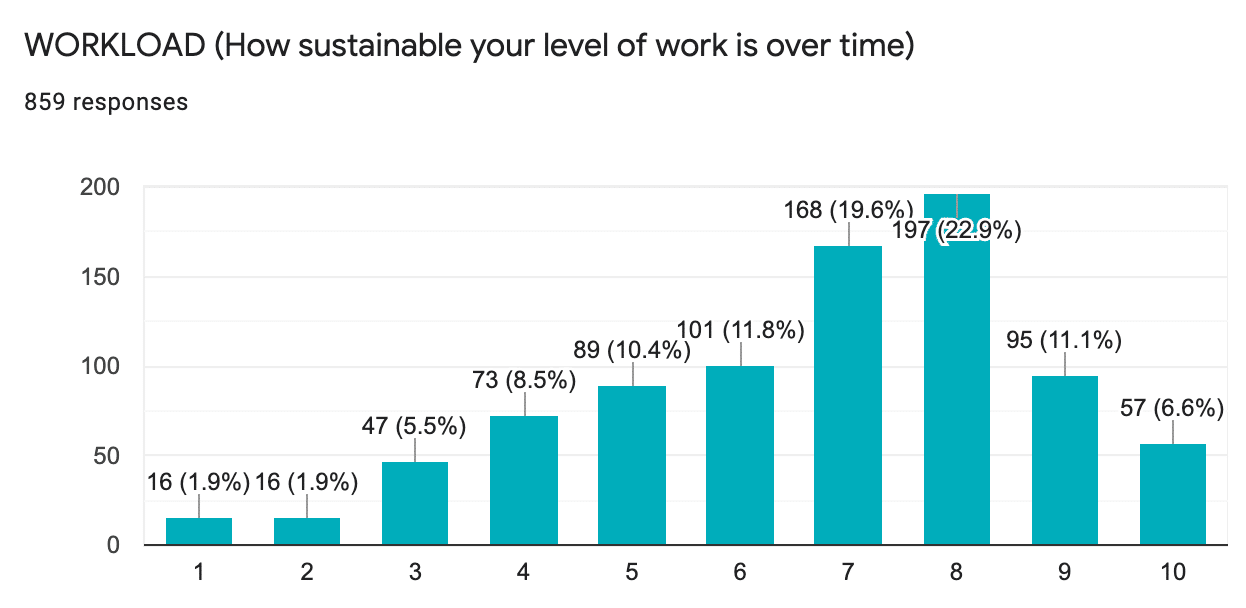
How is this showing up for SLPs?
“The day is not enough to do all the duties we have been given (IEPs, evaluations, transfers, referrals, progress reports, billing, meetings, therapy planning, bus duty, etc.).”
“It’s the extra stuff that doesn’t relate to our work but takes so much of our time. Things like staff meetings, department meetings, Educator Effectiveness, etc.”
“What stresses me the most is that I don’t have time to plan during my planning time. My planning time is taken up with logging, IEP’s, progress reports, billing, etc.”
“The referrals have been non-stop since returning to in-person learning.”
“I got 5 SLI referrals today.”
“I had to explain to my EC teacher this year how he gets a sub if he’s out but I need to make-up the visits to hit frequency!”
“An added stress this month is the number of make-up sessions I will have for students who are in quarantine… So many!”
“I don’t have time to go to the bathroom or to go out to get lunch!”
What are some ideas to work on addressing this trigger?
Mindset
“I shifted my mindset. Even though the Medicaid billing is a pain, it makes it possible to go to PD presentations.”
Here’s a blog post all about mindset, if you’re inclined to dive in more!
Therapy Strategies
“I am a big fan of single item therapy. I plan one activity for the entire day and adapt it to the groups (instead of using something different for each group). I used lots of literacy-based therapy.”
I also offer a totally free 5-day challenge to walk you through literacy-based therapy. It includes quick, to-the-point, 5-minute training videos and tools to help you streamline your therapy planning!
Paperwork Strategies
“I schedule time for paperwork in my day.”
“I blocked out one day a week for meetings, evaluations, paperwork, and consultation.”
“I create templates with colleagues for the different documents we need to fill in.”
“I created Google Forms for teacher/parent questionnaires. It saves a lot of time!”
“I have benefitted so much by moving to electronic notes.”
“I write my note while I’m with the student and bill the same day.”
Service Delivery Strategies
“I provide classroom interventions.”
“The multitiered approach can help with this, as long as the admins are on board. Lesley Sylvan has a practical book about this.”
“My district does therapy the first three weeks of the month, and we use the 4th week (if there is one) for make-ups due to SLP absence and school activities (like benchmark testing). We do not make up time for student absences.” ASHA provides some resources, in case you’d like some more detail/clarification on this!
“I reduced the number of weeks I see students yearly. My time is written X minutes/year. I’m doing 25 weeks instead of 30. This allowed me to take assessment weeks, have time for IEPs/report writing, etc. The speech team got together and made this decision in response to increased caseload.”
Advocate
“Put on your big girl pants and speak up for yourself. Don’t worry about being a pain. You are not! You (and your students!) are important.”
“I advocate my yourself. I learned how to say ‘NO’ to the things I can’t handle.”
“I was successful in decreasing my workload by advocating for myself and my students. I created a schedule with lunch, planning, and evaluation time first, then added the students. When I could not fit any other students, I let the director know that those other students did not have an SLP. I was able to get part-time assistance, and I was eventually able to get a full-time SLP. Life has been much better now that we have 2 SLPs at one school.”
“I document my workload on my calendar and fill in the ASHA workload calculator. I show it to my supervisor and cross-reference union agreements.”
“I started putting my regular weekly therapy schedule and blocks for evals and paperwork into my Outlook calendar so my admin can easily see what I’m doing when.”
“I document how much overtime I am working and what work I am doing outside of work. I advocate for myself when asked to take on more. I use data to show why workload is not manageable.”
“I shared with our Board of Education that students were missing 40% of their sessions because I was having to cancel to do evaluations, screenings, IEP meetings. Based on this data, they hired another SLP.”
“When communicating with administration, I present a solution–rather than just stating the problem.”
“Working in a district with a strong union has definitely been really great for having a reasonable workload.”
“Reach out to your LEA for support, and go up the chain from there.”
Ideas for Support
“My district hires SLPAs to support high workload.”
“We have secretaries that do a lot of the non-skilled paperwork end for us.”
“In my district, we have an admin who handles IEP paperwork and scheduling.”
“We need substitutes. I feel so much stress when I think about if I have to be out for any reason, even if I’m sick.”
“I worked as a contractor in a nonpublic private school. The therapists did the therapy notes and the SLPA finalized the billing.”
Set Boundaries
“Don’t do your work at home at night, weekends, and breaks. If it doesn’t get done, maybe admin will get the picture. We have to stop working on our own time to meet deadlines or keep in compliance.”
“I have stopped bringing ANYTHING home. Now, I am telling parents the caseload reality.”
“SLP’s are not responsible for making up missed sessions at school; your district is responsible. You’ve earned those personal and sick days! Our state organization recently stressed this!”
“I don’t let myself get behind on billing. I am willing to stay later one night a week, but I set my limit there.”
“I never left school before Medicaid billing was complete. There was no way I was going to bring that home. I did bits and pieces during the day.”
2. Control
Control was rated as a strong burnout trigger (a score of 7-10 on the rating scale) by 31% of SLPs. The average rating was 5.1.
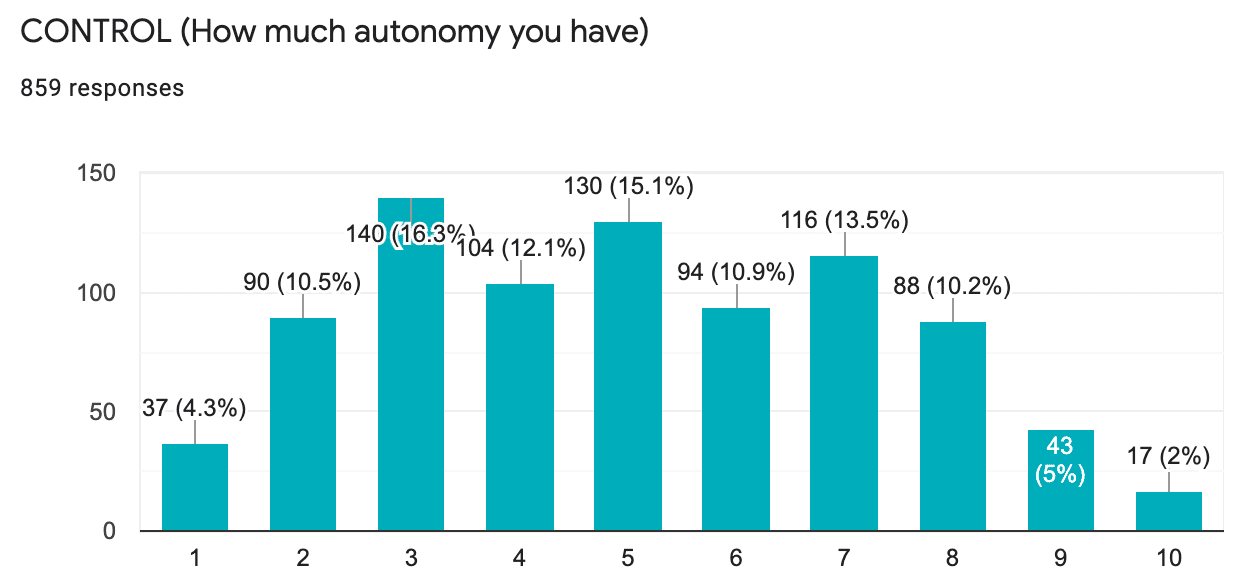
How is this showing up for SLPs?
Here’s what some of us are struggling with…
Administrative Support/Understanding
“Two new administrators think they know my job better than I do after 30 years. THEY DO NOT! I used to have a much higher caseload and workload, but certain administrators over the years has made many of our lives intolerable.”
“They think they know my job better than me, because I’ve been over 25 years. New admin just has their own judgments and ideas that they are implementing on everyone, regardless of student need.”
“In terms of playing a part in deciding or weighing in on determining district policies, I feel like our SLPs have very little autonomy.”
“It feels like the district bends to parents WAY more than they listen to data, reason, etc. This can be frustrating.”
Ethics
“I’m not able to say ‘no’ to new clients/diagnoses that might be out of my wheelhouse.”
“I work in non-public schools, so there are strict rules that all students are seen once a week for 30 minutes, all pull out and group.”
Scheduling Constraints
“I am having trouble with control because I am preschool inclusion. I rely on trying to fit my students’ needs around the teacher’s daily schedule, and I can’t always get my minutes in due to classroom expectations.”
“I make my own schedule, but there are so many times in the day I’m not allowed to pull students. ALL students have core classes at the same time.”
“I get frustrated that I am scheduled for IEP meetings, even when I have the time blocked out on my ‘public’ calendar for my sessions and district meetings.”
“If my day is completely scheduled with conferences and seeing students, when exactly am I supposed to do paperwork during work?”
“When I worked in private practice, I didn’t have control. They made sure I was always at 85% productivity. (I was seeing clients 34 out of 40 hours.) They made my schedule, and I had no control. They would schedule me 4-5 hours back to back without a break.”
Teacher Training
“I hate having to attend all-day teacher training ‘just because.’ I had reports to write, calls to make, tests to score, therapy planning to do, etc. I feel like I’m sitting there wasting a full day bored and frustrated.”
But we do have a few wins!
“Control is really the only positive for me. I appreciate the flexibility of my job.”
“In terms of my daily work and service delivery modes and methods, I have plenty of autonomy.”
“I’m lucky to be able to create my own schedule and it’s helpful to create time to schedule make-up sessions, paperwork, or meetings.”
What are some ideas to work on addressing this trigger?
“I take advantage of the opportunity to make my own schedule and determine when my breaks are.”
“Blocking out times during the day made me feel I had more control over documentation and other chores.”
“At the end of the day, I post a ‘Do Not Disturb’ sign on my door, turn out the lights, and get the paperwork done for that day. If teachers come to the door, I leave a message on my sign to make an appointment to speak with me.”
“I strictly manage my caseload so that only those who are in need of therapeutic intervention qualify. Others receive some other type of indirect intervention or consultation. I do this while I keep my fellow SLPs in my district in mind so that I don’t do anything that could potentially increase their caseloads if children move or are assigned to other schools.”
“We have to remember that we have some control over our own caseload. I am trying to be more thoughtful when writing IEPs to recommend services that will be effective and workable, rather than just the traditional recommendations. I am doing a lot more push-in and teacher consultations for students who are close to being discharged. We are the experts and we need to be more comfortable presenting evidence for the service delivery models that are best for our students. Co-teaching and collaborating with other specialists in the school district has also been helpful. ”
3. Reward
Reward was rated as a strong burnout trigger (a score of 7-10 on the rating scale) by 38.5% of SLPs. The average rating was 5.5.
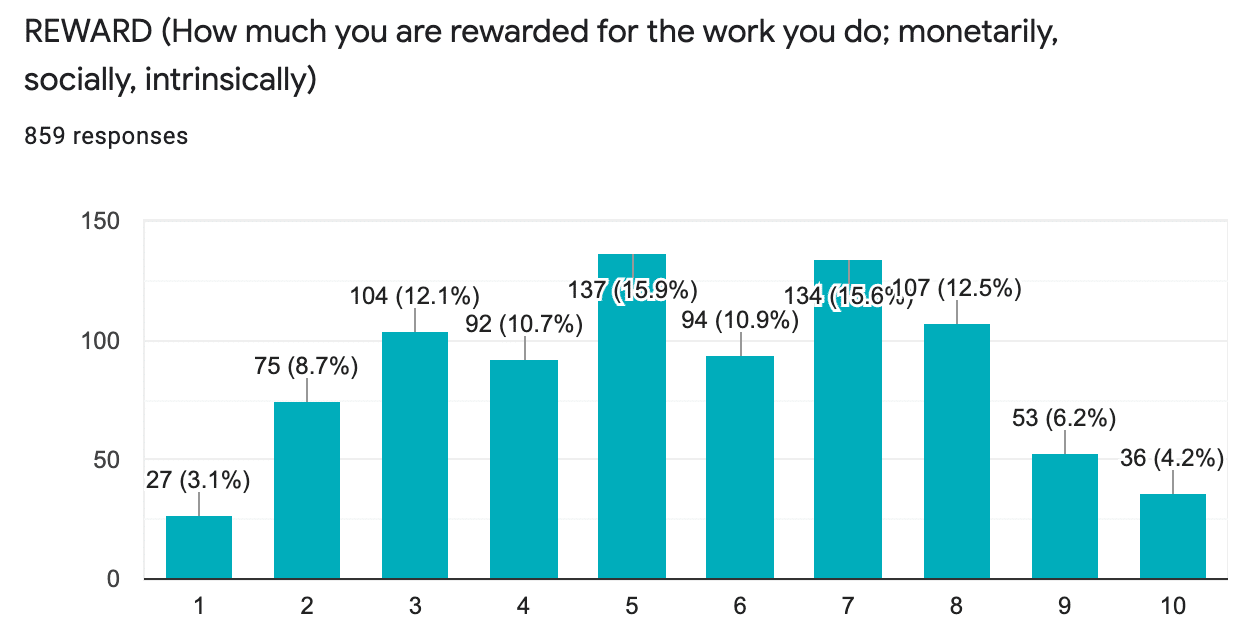
How is this showing up for SLPs?
We were a little quieter on this trigger, but here are some of the comments related to Reward:
“The pay is stupidly low. Our district is offering a pay raise to subs and we have tons of contract workers who make more than we do, but no raise for us.”
“It just feels like I am not able to do anything well because of being pulled in so many different directions.”
“I got a nice note from a teacher after a meeting yesterday. It was so wonderful!”
What are some ideas to work on addressing this trigger?
“Because we had a separate group for SLPs, our teacher’s association negotiated for us with our input. We had a separate salary scale which reflected our level of education.”
“Join the teacher’s union. Several of our SLPs threatened to quit and now we have ASHA dues and licensure paid. We also get reimbursement for Medicaid billing.”
“I like to send a quick positive email to teachers about a student while the student is still in my room. It takes no time and the student, teacher, and I all feel good.”
“I post those positive notes and pictures in front of me on my bulletin board to remind me that I am appreciated.”
“I keep a folder/envelope of all the positive emails and cards from parents, drawings from students, emails from students, present and former. I refer to these at really challenging times. I have some really supportive families and students in the midst of all these challenges and that’s where I choose to focus when things are difficult. I have been working for 37+ years as an SLP.”
4. Community
Community was rated as a strong burnout trigger (a score of 7-10 on the rating scale) by 27.5% of SLPs. The average rating was 4.8.
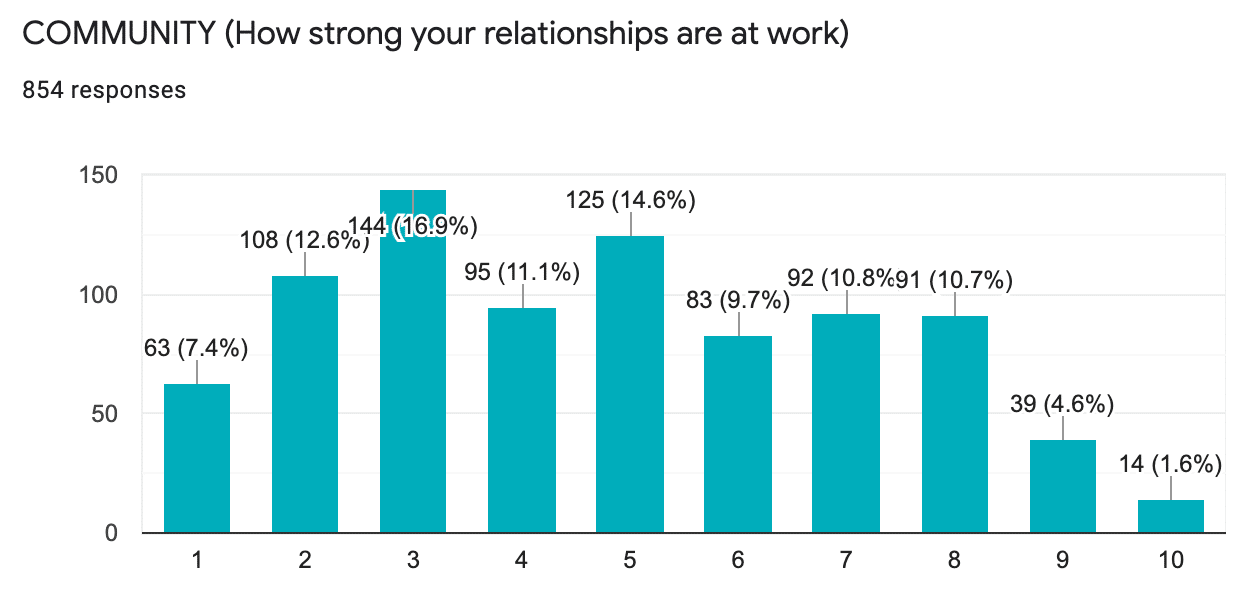
How is this showing up for SLPs?
This is clearly a need for many of us…
“I’m the only SLP in my small district.”
“I work at three schools, so community is a tough one for me.”
“Who has time to foster relationships at work when we are working through lunch and every other minute of the day?”
“Working in telepractice in the schools keeps me really separate from others and the sense of community is totally lost.”
However, there were far more positive comments related to Community:
“I love my students. They can make me laugh any day!”
“The community is the part that makes the job worth it for me. I have some great relationships with my coworkers and parents.”
“I get great satisfaction from the connections I have with my students and being able to engage them in a variety of ways. I also enjoy building relationships with the families.”
“I’ve had more parents thanking us for sticking with teaching with all this stuff going on. That has been nice.”
“YES! I love my teachers and they love me! They learned how to implement strategies, and I learned about their curriculum.”
“I share an office with another SLP and we are constantly collaborating and bouncing ideas off of each other.”
“There are 7 SLPs at my school, and I’m the newest one. Never have I felt like an outsider. They have accepted me with open arms, and the teachers have followed suit.”
“If it weren’t for my fellow SLP’s at work, I don’t think any of us would make it through a week. I am lucky to work with 5 other supportive SLPs.”
“We have 9 SLPs in a pod in my school, and we support each other emotionally and professionally. It really helps to have people to talk to.”
“The community is one of the main things keeping me in the school setting. Even when I am on speech island, it has way more bridges than when I worked in SNFs with a 90% productivity ‘requirement.'”
What are some ideas to work on addressing this trigger?
Try New Service Delivery Models
“Co-treatment and push-in model approach helps build a positive community.”
“Push-in really helps teachers learn what we do and value our knowledge. They model what we’ve done, which is a win-win.”
Interns
“I take interns whenever I can. It’s really nice to see everything with fresh eyes.”
Be Intentional
“If you want support, you have to be supportive of others. Take time to say hello, catch up, and offer to help with a simple task.”
“Eating in the staff lounge helped me.”
“I make sure to have lunch with my special ed teachers to just talk about life 2-3 times a week.”
“Phuong Palifox made the recommendation to us to give student ‘shout outs’ regularly. Just 1 per day can make a huge difference in your relationship with parents!”
“When I am feeling overwhelmed and struggling to connect, I take a step back and think of one simple thing that I can do or work on with just one student that could make a difference. OR I just pick a day or two to just HAVE FUN with my students. That often does the trick for me!”
What Districts Are Doing
“Our speech department meets once monthly for ‘What Works Wednesdays.’ It gives us the opportunity to share successes, needs, and ideas.”
“My team meets every Wednesday for 1.5 hours to discuss at-risk or current students we support. Definitely a time to feel connected.”
“My large district is divided into regions. This helps to make our team feel smaller and helps us to build community. Our SLP team also has a Facebook group that we sometimes use to problem solve or to check in with each other.”
“I’m thinking of moving to a larger district that has more SLPs. I have heard that they get together for PD and get to know each other.”
“I was in a small district where I was the only SLP for K-8. I collaborated with other SLP in the high school sending district. It was great for support and ideas.”
5. Fairness
Fairness was rated as a strong burnout trigger (a score of 7-10 on the rating scale) by 38.4% of SLPs. The average rating was 5.5.
This was rated as the second strongest burnout trigger.
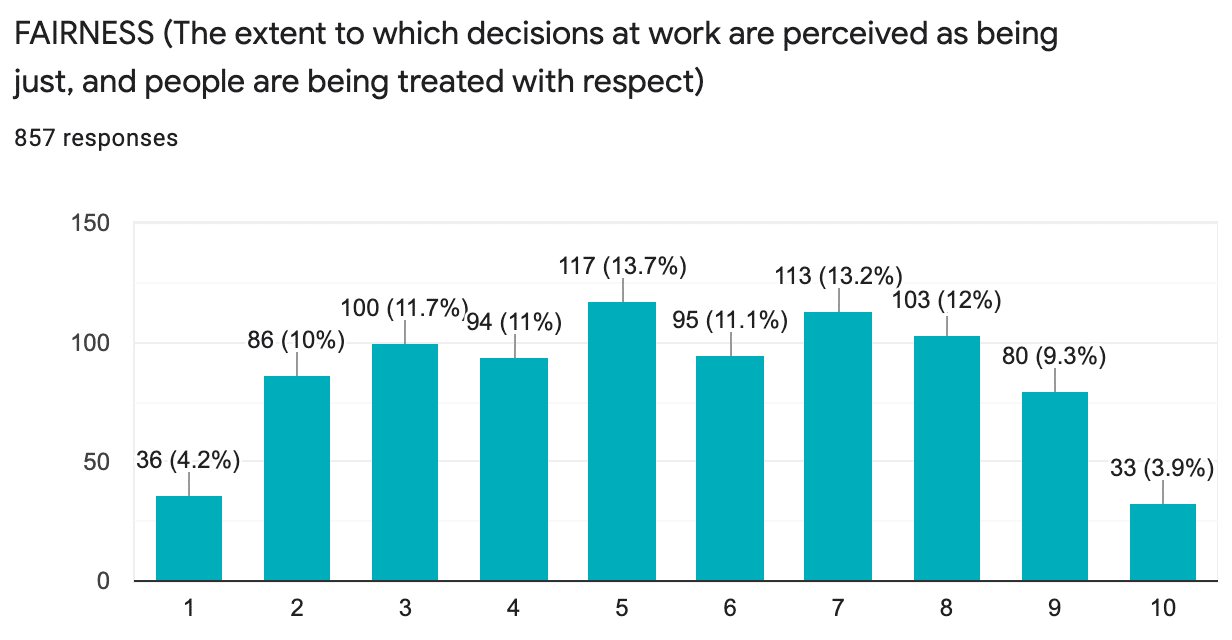
How is this showing up for SLPs?
Being Seen
“I feel like we are treated like they want us to be isolated robots with the workload. Do therapy, quickly document and that is all. But, you know that is not all we do.”
“The School District does not seem to care and is unwilling to work with us.”
“Administrative decisions do not feel fair. The way they treat professional teams is sometimes not equitable. Some professionals are expected to do more workload-wise compared to others. Sometimes the pay is different, too.”
“I feel my coworkers trust my judgment, which is nice! But they also think that I ‘have it easy’, which feels really isolating.”
Unfair Expectations
“Our headstart has 27 evaluations within 30 days, with all of the meetings after school and deadlines within 40 days. No other SLP in the district is required to do IEPs after school!”
“My biggest stressor is the fairness aspect. I don’t understand why admin thinks SLPs need to be trained in a 100 different educational programs. At no time will I be teaching math…”
“I’ve been pulled from providing services multiple times to be a teacher’s aide. It’s not fair to the kids or myself as I then had to complete make-ups.”
Space
“Fairness is my biggest trigger. I would love to have adequate office/therapy space at a school site. Just once. Not a leftover conference room that is shared with others.”
“SLPs are often thought of last. We work in closets and have to work around programs like reading intervention, PE, music therapy, etc. We have to be the most flexible. It doesn’t always feel fair.”
“Our general education counselors have their own offices, while all of the special education service providers have to juggle space and share. It makes us feel less respected and less valued.”
Adequate Services
“I disagree with placement decisions where severely cognitively impaired children are not getting adequate services. Teachers and SLPS feel our opinion doesn’t count with administration, even when we have the data to support our views.”
Billing
“I definitely struggle with the fact that we have to bill Medicaid for our district to get reimbursement for services, yet I don’t get any of that money to better serve my students (e.g., materials, professional development).”
“Our Medicaid reimbursement funds go to pay administrators.”
What are some ideas to work on addressing this trigger?
“I have found that finding something good to say about the people who may make my job more difficult (and sharing that with them!) can help put the other person in a place to work on the change in dynamic.”
“Ask for what you need. Communicate! Share data and offer potential solutions.”
“I feel I gained a lot of respect by being open to doing staff training and allowing for questions/shadowing.”
“I stopped being an employee of the school systems. There is a lot more freedom in working for a therapy company.”
6. Values
Values was rated as a strong burnout trigger (a score of 7-10 on the rating scale) by 26.8% of SLPs. The average rating was 4.7.
Many of us still connect with our work at a deeper level, which is great news!
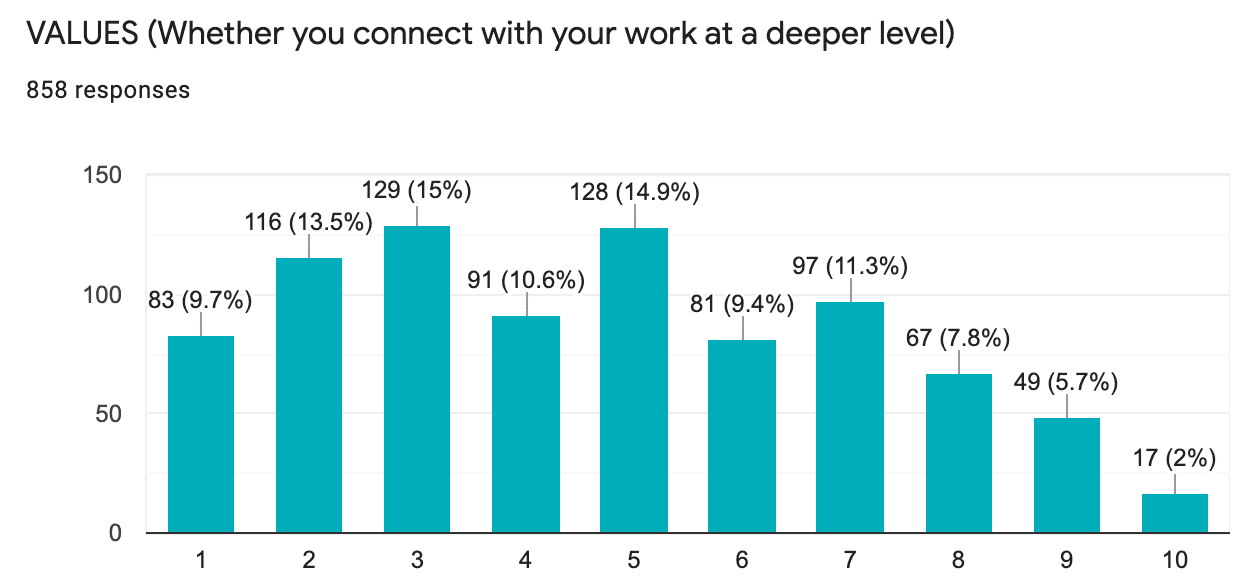
How is this showing up for SLPs?
Quality of Services / Making a Difference
“I feel like the students are NOT getting what they should be getting!”
“I’m guessing those that rated value as high did so because when our caseloads are super high, we tend to feel like we are not helping anyone.”
“I have been doing this for over 40 years. I love doing therapy and I still love planning and trying to come up with new and motivational activities. It is just that with the caseloads, it is not the quality I would like it to be and it is frustrating.”
“If I have 8 kinds in a group working on different skills, am I really providing FAPE? That can really weigh on me when the caseloads are high.”
However, a lot of SLPs shared this as a strength…
“I love my students and I love what I do! The therapy is what I love!”
“I’ve always felt our profession is valued and brings much to others.”
“Helping my students find their voice is my passion, so I always try to go back to that purpose in my job.”
“Seeing a child succeed and have the ‘AH-HA moment(s)’ is REALLY WONDERFUL! Enjoy that moment and savor it!”
“I love to learn. I will never learn everything in the field of speech-language pathology. I also love that I find people in my ‘tribe’ every place I’ve ever worked.”
What are some ideas to work on addressing this trigger?
“I remind myself of why I chose this field in the first place.”
“I find small joys and build from them.”
“I do a daily gratitude journal.”
“I have a folder with all of the cards, notes, drawings, etc. of gratitude I’ve been given over the years. I look at it on the bad days and am reminded of my why!”
“I moved to more of a 3:1 model last year. This year, I am able to see more of my students in the gen ed setting. This allows me to help with generalization and carryover more and allows me to connect more with the staff and help them understand how important what I do is.”
“I developed a private Facebook group for my staff of SLPs to share resources, ideas, and success stories. It was clear that it wasn’t for complaints. Those needed to be handled in a different manner.”
“We need to bring it back to our students every day. They are why we do it. Emphasizing gratitude is important.”
“Making more of a connection with my co-workers and creating a ‘team’ environment has helped me to feel more value as an SLP.”
What now?
We clearly have our work cut out for us! We have a lot of room for growth.
One of the big takeaways from the presentation is to focus on what we can control. We may be able to take some action to address the triggers, but there are some things that we won’t be able to change.
Here’s an exercise that may help…
Take a moment to jot down all of the things that you are struggling with at work.
Which one has the biggest impact on you?
There’s almost always something we can do. We may not be able to fix the problem right away, but is there something we can do to move in the right direction or to decrease the impact?
Check out the suggestions above for some “problem-specific” inspiration.
If there isn’t a solution that makes sense right now, keep reading!
Bonus points if you wrap up this activity by jotting down what you do appreciate about your job.
What can we control?
We may or may not be able to control specific triggers, but we can control our mindset and how much we let these triggers impact us!
I know, I know! This may feel like a silly suggestion when you’re struggling with a really big issue. How in the world will silly little habits like breathing help me with my massive caseload?
Here are some thoughts that SLPs shared in the chat:
“Self-care is so important. I think back to my earlier years about all the worry and anxieties on writing reports/doing IEPs. Just not worth it. Even the simple things (like eating lunch and going to the bathroom) are part of self-care.”
“I was diagnosed with stage 1 breast cancer in September of this school year. I 100% believe that the high level of stress at work as an SLP contributed to this. Self-care is not selfish.”
“I did not take care of myself during my CF year, and now I have an autoimmune disease. You have to take care of yourself or you end up paying the price. I learned this the hard way.”
“I was forced to deal with burnout this past month. I got so sick I had to have surgery. All related back to stress.”
“I remember that as much as I love what I do, I want my own life. I didn’t sacrifice and give my life to this career. I know what I’m worth and I have to remember that districts/jobs/clinics need us more than we need them. There are ALWAYS jobs and we have to recognize and accept our own worth and value.”
If we don’t take care of ourselves, how can we expect to keep showing up for our students (and in our lives)?
So what could this look like?
Create a menu of options for yourself. What can you do…
– In the moment (e.g., take a deep breath, turn on some music, think of one thing you’re grateful for)
– When you have a few minutes (e.g., take a walk, meditate, watch a funny YouTube video)
– When you have time to invest (e.g., get a massage, read a book, meet up with friends, take a yoga class, go on vacation)
During the presentation, I shared lots of research on how these types of activities can significantly reduce your stress levels.
Here are some other ideas shared by SLPs:
“I realized changing my perspective has been really beneficial for my mental health.”
“Write and rate goals for yourself just like we do for students. One year my goal was to eat lunch every day.”
“Take all of your personal days. It helps a lot!”
“I stop when I’m too stressed. I take a couple of minutes and put a meditation on my computer while I clean between students. It helped calm me a bit.”
“I actually scheduled bathroom and short breaks in my schedule (with my admin’s encouragement).”
“I downloaded the Balance app on my phone.”
“I love the Piano Yoga playlist on Spotify.”
“I used to keep the word BREATHE on my laptop to remind me to breathe and relax as I worked on my computer. I had a parent ask me at a conference when he saw it if the word was for them. I told them if it helped, go for it!”
Making Changes
Several SLPs shared that they changed their circumstances!
These ideas may not be doable for everyone, but here are some options:
Reducing Hours
“I reduced my work hours to maintain my sanity. Totally worth it even though getting by on a little less money.”
“I could no longer do the job full-time. I switched to part-time. It was the only way I felt like I could serve my students the way I wanted and also have some work/life balance. The difference in my mental health and job satisfaction has been significant.”
Changing Settings
“I prefer the flexibility of private practice. Part of also being a good SLP is knowing when to say “no.” I have a waitlist going and have just learned I can only take on what I can take on. I have also decided to get less pay and be subcontracted; this means someone else does the billing to various funding sources for me. I just submit my hours for each client. That alone has helped my stress.”
Several SLPs have also switched to teletherapy.
Changing Schools
I didn’t see any specific comments about this, but it is clear that some districts are more supportive than others. Don’t be afraid to explore other options! If you are interviewing at a district, ask to connect with some of the SLPs. This can be a great opportunity to get a feel for what the unique strengths/challenges are for that particular district. No district will be perfect, but you may be able to find a better fit for you and your needs.
Wrapping Up
Whew! That’s a lot!
Remember, meaningful progress is supposed to be slow.
Pick one strategy to start with.
Pick a strategy that feels easy and that you can easily stick to.
You’ll be amazed to see how big of an impact one little thing can have!
You’ve got this, SLP! 💛




On paper, my job should be great – one school, same schedule as my kids, very short commute. But this school year has made me seriously doubt whether I can endure another 25 years in this field before retirement. Thanks for the practical, encouraging and specific ideas in this post!